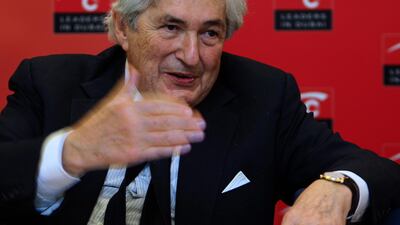James Wolfensohn, a former president of the World Bank who paved the way for debt relief for the poorest nations during a tumultuous decade for the institution, died at his home in Manhattan, New York, on Wednesday. He was 86.
A former air-conditioning salesman, Wolfensohn graduated from the Harvard Business School and rose up the corporate ranks to become a prominent financier. During his stint at the bond trading house of Salomon Brothers in New York, he helped fix the finances of major US institutions such as Carnegie Hall and the Kennedy Center.
He was later appointed the ninth president of the multilateral bank by then-US President Bill Clinton and led the Washington-based lender from June 1995 through to May 2005. Born in Australia, he acquired US citizenship in 1980.
While leading the World Bank, Wolfensohn focused on the institution’s core purpose: fighting global poverty and helping the world’s poor forge better lives. Under his leadership, the World Bank implemented a range of significant reforms and broke new ground in areas including fighting corruption, debt relief, climate change and gender equality.
From his corporate experience, Wolfensohn knew that bankrupt companies and individuals could be given a chance to restructure their debt, but there was no such scheme for countries.
In 1996, Wolfensohn and Michel Camdessus, his counterpart at the International Monetary Fund, launched the Debt Initiative for Heavily Indebted Poor Countries, which created a framework for all creditors to provide debt relief to the world’s poorest.
“Debt relief was one of the most important things that came out in my period in the [World] Bank, because the notion of regularising the debts of impoverished countries was quite revolutionary,” he was cited as saying in a World Bank oral history, recorded after he left the institute.
He is credited with being the first World Bank president to bring attention to the problem of corruption in the area of development financing.
In one of his speeches as World Bank president, he said: “We must tackle the issue of economic and financial efficiency. But we also need to address transparency, accountability and institutional capacity. And let’s not mince words: we need to deal with the cancer of corruption.”
Unlike his predecessors, Wolfensohn brought with him explicit ideas about how the World Bank needed to be reformed.
Wolfensohn left the World Bank on May 31, 2005, only the third person to serve two full terms as president after Eugene Black and Robert McNamara. Upon stepping down, he founded Wolfensohn & Co, a privately held firm that invests, and provides strategic consulting advice to governments and large corporations doing business in emerging market economies.
IMF managing director, Kristalina Georgieva, mourned the loss of Wolfensohn, her mentor and former boss.
“He was a hero to me as he was to so many and particularly the world’s most vulnerable,” she said in a statement on Thursday.
“Jim transformed the world of development and he transformed the World Bank. In the process, he became, quite literally, the voice for the poor people on our planet.”
Ms Georgieva said as former World Bank chief, his lifelong commitment was to fight poverty with passion and professionalism.
“He was a brilliant financier, a generous philanthropist and, above all, a great humanitarian who always put people first,” Ms Georgieva said.


